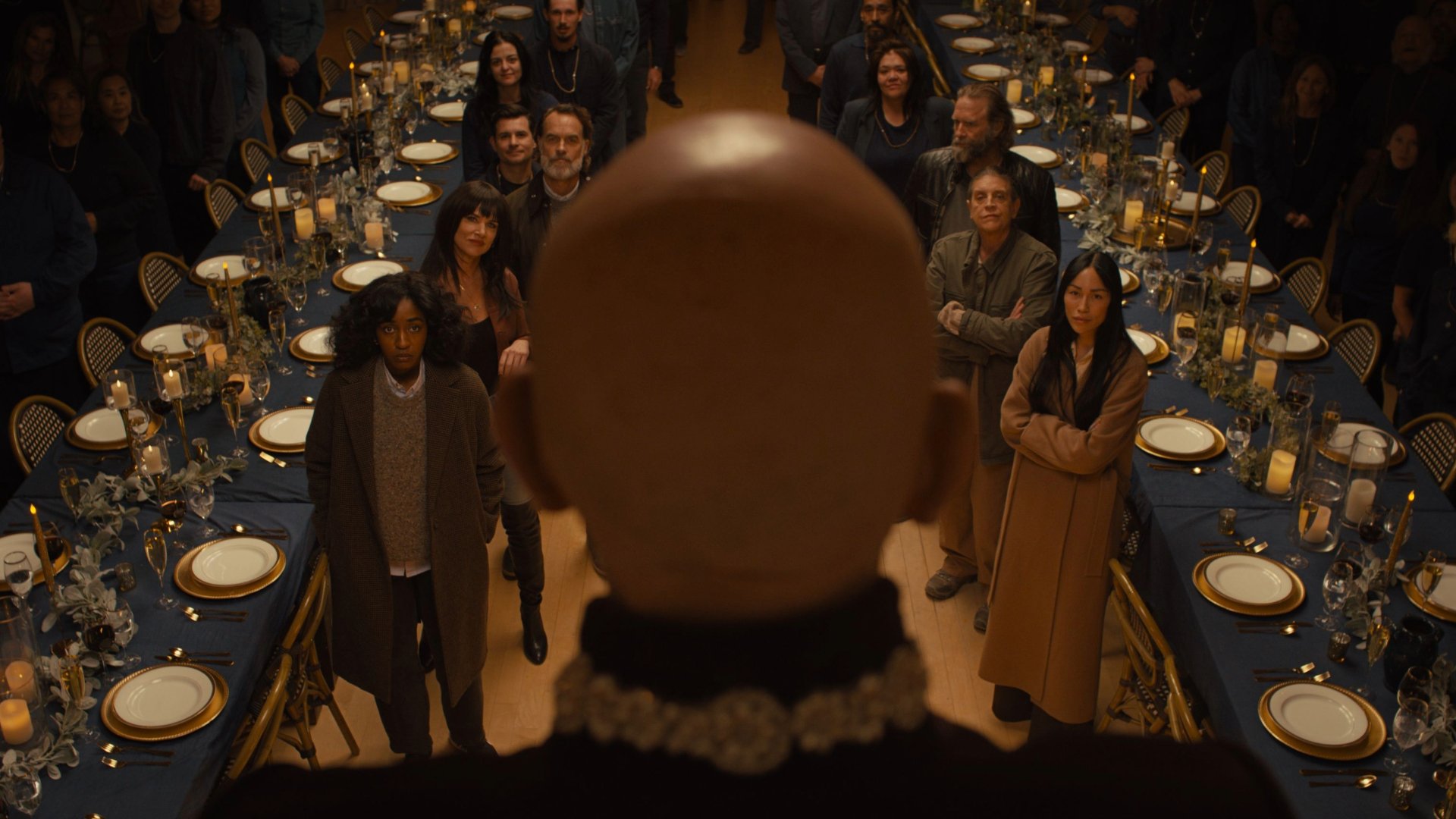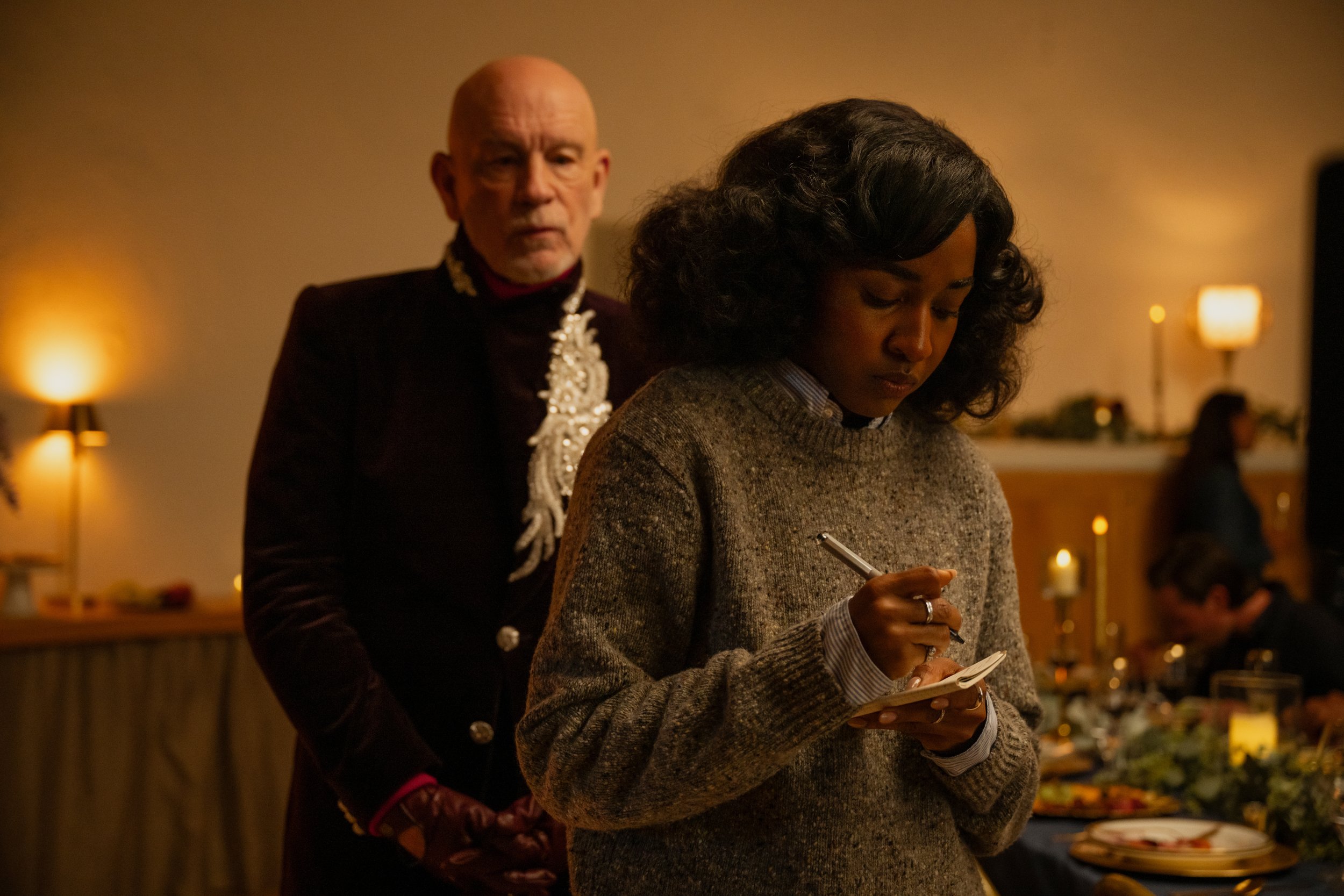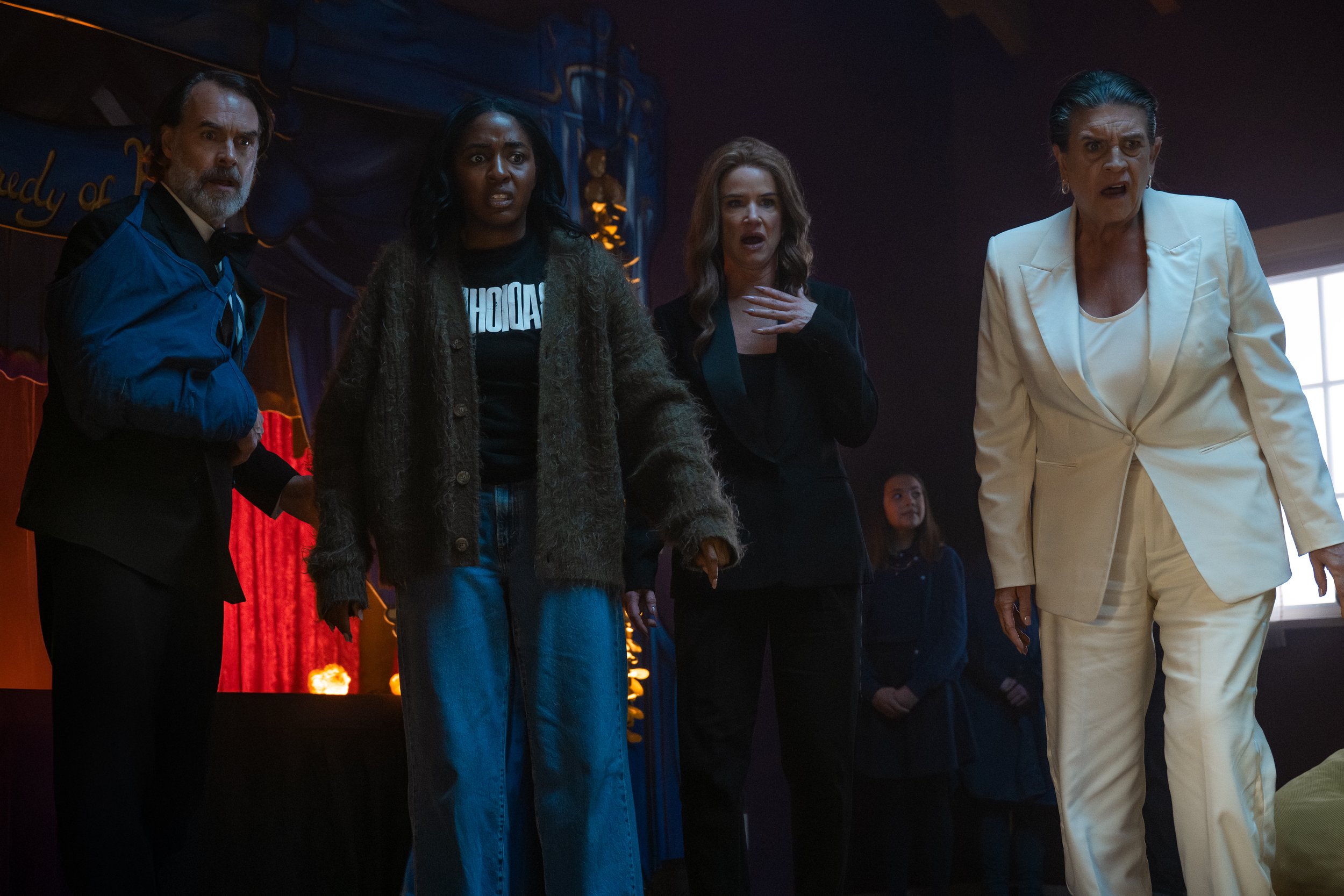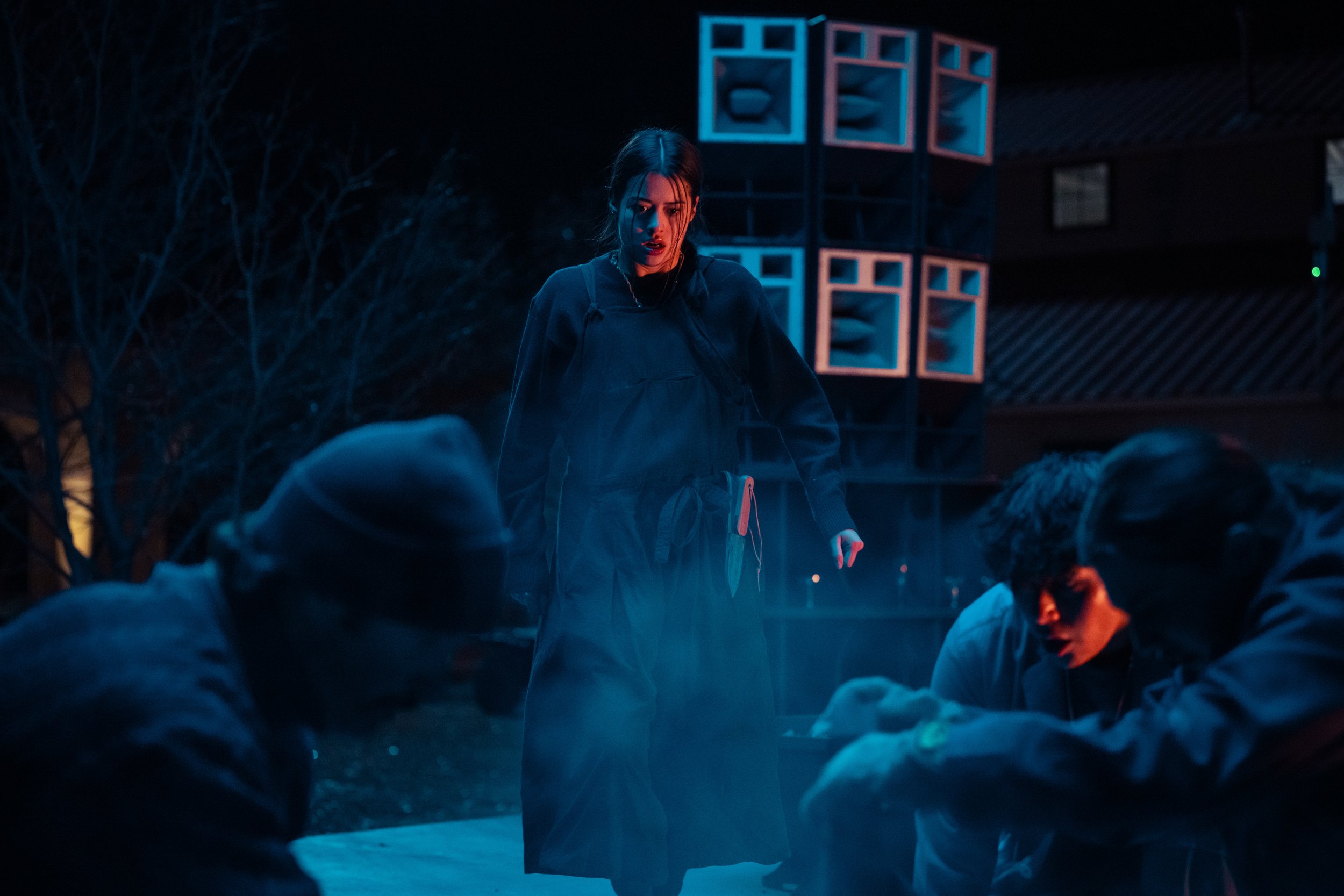'Opus' Review: A Celebrity Cult Thriller Full of Sour Notes
Over these past few years, we had countless class commentary thrillers about 'celebrity obsession.' Specifically, premises about a lower-class protagonist trapped in a single-set location with a rich king of their craft with a cult-like following. Their followers can be their workers (The Menu) or their enabling group of friends (Blink Twice). Either way, deadly complications ensue and the lead has to pull a 'Get Out.' What distinguished them, despite their flaws, was their distinct vision, tone and perspective on a similar theme. Mark Anthony Green’s Opus, however, arrives at the party late, frazzled and confused. Like a student's research paper written at the eleventh hour, Opus tackles ‘celebrity culture’ with little precision, for it's far too concerned with pulling off a 'Get Out' than being coherent in its discussion about the bridge between celebrities and journalists. Think of that theater critic scene from Birdman in all its weightlessness in the guise of a thriller.
Image copyright (©) Courtesy of A24
MPA Rating: R (violent content including a grisly image, language, sexual material and brief graphic nudity.)
Runtime: 1 Hour and 43 Minutes
Production Companies: Makeready, MACRO
Distributor: A24
Director: Mark Anthony Green
Writer: Mark Anthony Green
Cast: Ayo Edebiri, John Malkovich, Juliette Lewis, Murray Bartlett, Amber Midthunder, Stephanie Suganami, Young Mazino, Tatanka Means, Tony Hale
Release Date: March 14, 2024
Young, scrappy music journalist Ariel Ecton (Ayo Edebiri) is among a select few invited to the secluded compound of Moretti (John Malkovich), a 90s mega pop star on the verge of releasing his first album in 30 years. Her editor-in-chief, Stan (Murray Bartlett), who was also invited, insists that she’s only there to take notes—he’ll be writing the piece. But Ariel is hungry for a real story, unlike Stan, who has already settled on his angle. Upon arrival, Moretti's estate appears to be a small cult town where he's surrounded by loyalists — insert Jared Leto joke here. When invitees start disappearing one by one, Ariel finds herself at the center of a deadly plot and must find a way to escape.
Opus Boasts Good Performances and Good Tunes
The Opus leads all deliver fine performances from the underwritten material. It's nice to see Ayo Edibiri tackle a thriller and her first foray into the genre shows some strong range for her already wide skillset as a performer. Most of the film has her operating in a similar “weirded tf out” sphere as that Ayo Edibiri-Prince William meme. The plotting of Opus matches that of Get Out, right down to Edebiri being trapped and channeling Kaluuya’s iconic face of terror. Though I'm a sucker for whenever an actor grows a slow burning discomfort resulting in that bulge-eyed, paralyzed, single-teared state of terror. It will never cease to send a shiver down my spine. Still, Green doesn't muster any of the rising tension, thrills, or terrifying elements to earn that moment.
John Malkovich leads the charge, approaching Morietti like a cross between Willy Wonka and David Bowie. He has the flamboyant movement and sexual zeal down pat, mimicking the artists of the same fare as Morietti without feeling like a caricature. The crafting of Morietti's persona is also elevated by the few original tunes produced by songwriting legends Nile Rogers and the Dream. Some of the tunes go hard, specifically the opening track 'Dina, Simone,' which will have you going from "Wait, John Malkovich can sing," to "Wait, this goes, really hard."
Opus Says Nothing New About Artists and Journalists
The conversation about artists and their relationship with journalists is desperately ripe for a nuance. In every other movie regarding a high-profile artist and journalist, the latter is portrayed as an uppity asshole. Initially, I thought Mark Anthony Green would be the perfect candidate to shatter that clichéd glass ceiling, considering his background as a former GQ editor. It was one of the reasons I was so anticipating Opus. Sadly, Green stays within those trope-filled perimeters and diverts any opportunities he gives himself throughout to take Opus in any fresh direction.
Early on, Ariel vents her frustrations to Kent (Young Mazino) about how undervalued she is at her job and how she wants something big to happen so she can tackle non-fluff assignments. That goes nowhere. At the compound, Ariel notices that all of her fellow guests — paparazzo Bianca (Melissa Chambers), Moretti’s musical rival Bill (Mark Sivertsen), social media influencer Emily (Stephanie Suganami), talk show host Clara (a wasted Juliette Lewis), and even her boss Stan — begin to buy into Moretti's seduction, turning into little stans in real time. The current landscape of media journalism is ripe for discussion, where misinformation and industry plants run rampant and journalistic integrity is in a weak position. Nothing comes from that either. Heck, some closeup shots highlight a glimmer in someone’s eye watching Moretti perform, maybe propping up a supernatural element to explain his cult-like following. Nope.
Opus: “We Have Get Out and The Menu at Home”
What Green does instead is a stripped-down iteration of Get Out and The Menu but make it the Manson Family Farm. From a production standpoint, it's very well-made. Tommy Maddox-Upshaw's cinematography creates an immersive and stuffy atmosphere that generally comes to life in the fanciful, ensemble-filled scenes. Formally, nothing else is worth writing home about.
The only other standout aspect is Amber Midthunder as Moretti's right-hand security detail. After seeing Midthunder's power in the should've-went-to-theaters Predator movie Prey, it's funny to see her in a hunter role. She is downright frightening every minute she's onscreen, even though she and Tatanka Mean are the only two Indigenous performers and are placed squarely in the "silent but deadly” trope.
After I had accepted that Opus was a weak clone with little to say, its finale takes an obnoxious 'gotcha' turn that feels borderline insulting. It’s one thing to be incoherent in your high-concept social commentary, but suddenly acting as if you were saying something the whole time has hits like the Sailor Moon "My Job Here Is Done / But You Didn't Do Anything" meme. Furthermore, it takes yet another turn, which reads more as political commentary than commentary on the cult of celebrity, its initial target.
Final Thoughts
Underdeveloped and airheaded, Mark Anthony Williams' When-You-Buy-Get-Out-Off-Temu thriller Opus wastes its potential as a social commentary about celebrity culture and its relation to journalists. Not even the talented performances of Edebiri and Malkovich can save this sour note of a thriller.




